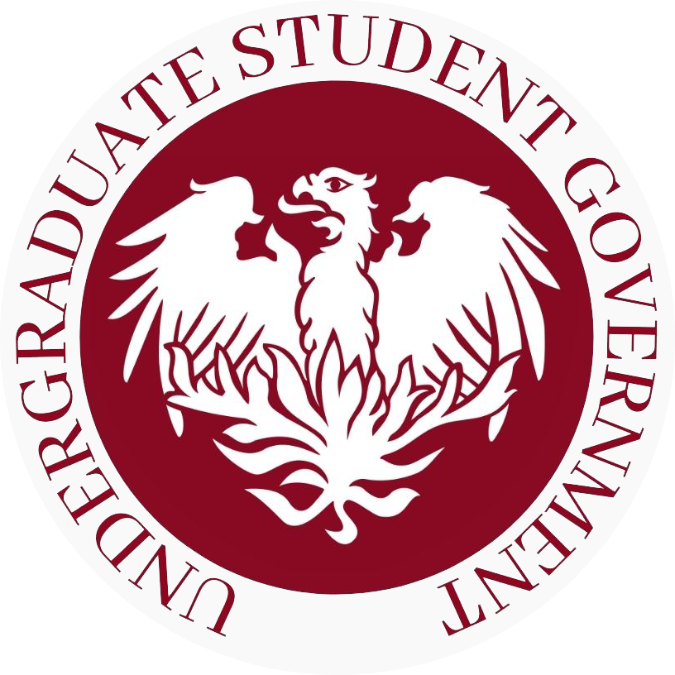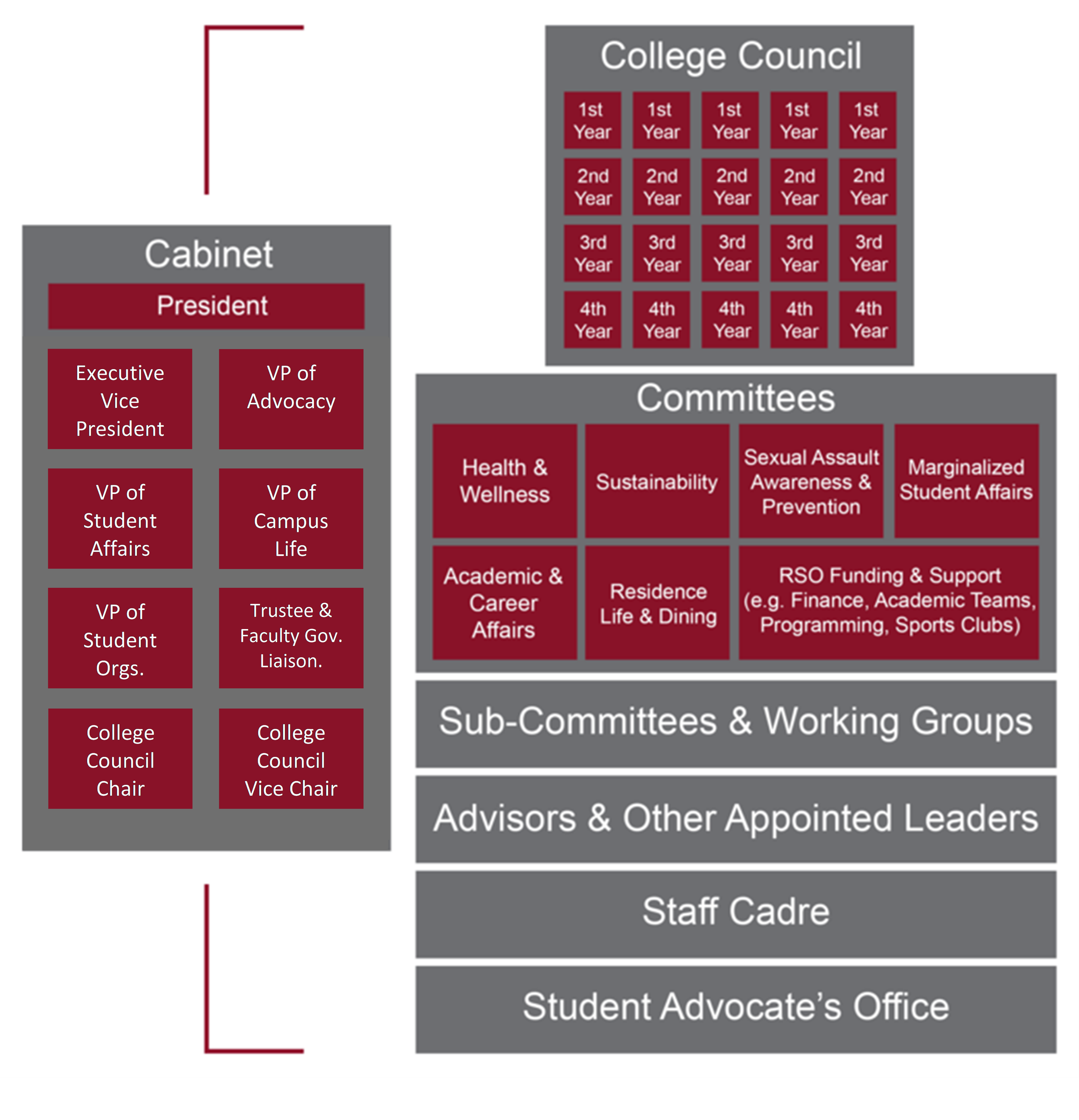The Nuts and Bolts
How USG Works
USG conducts a wide range of projects and initiatives — from funding an RSO’s upcoming event, to pushing for University-wide reform.
Most of these projects begin and are carried out in topic-specific committees — ranging from the Finance Committee to the Committee on Campus Sustainability. Project proposals are then brought to College Council for approval as a resolution, which often initiate a new project, guide an ongoing initiative, or finalize a policy. Resolutions usually call for policy changes by relevant stakeholders — like the administration.
The Cabinet, USG’s core leadership, oversees and guides these projects and initiatives.
Whether one serves as an elected College Council Representative, a leader in the Cabinet, or as Committee member, USG projects and initiatives are whole-of-government efforts — everyone gets involved to strive for a better University of Chicago community.
Positions in USG
Cabinet
The Undergraduate Student Government is led by the Cabinet. The Cabinet consists of a directly-elected President and Executive Vice President; a directly-elected Vice President of Advocacy, Vice President of Campus Life, and Vice President of Student Affairs; an appointed Vice President of Student Organizations; a directly-elected College Council Chair and Vice Chair; and a directly-elected Trustee and Faculty Governance Liaison. The President chairs the Cabinet.
The Cabinet oversees the big-picture operations of USG. It ensures that the bodies of USG are interoperable, works toward the long-term strategic objectives of undergraduates, and retains close relationships with key administrators.
The President and Executive Vice President are elected together as a Slate. The President has the power to veto legislation. Vetoes may be overturned by either a two-thirds majority of College Council.
The four issue-area specific Vice Presidents — VP of Advocacy, VP of Campus Life, VP of Student Affairs, and VP of Student Organizations — advise and facilitate the operations and projects of committees. The VPs ensure cross-committee collaboration but do not manage or override the policy decisions of the committees or the leadership of Committee Chairs.
College Council
The College Council is composed of twenty elected representatives who are the primary decision-making body of Student Government and voice of the Student Association. College Council meets in regular intervals to review, debate, and approve final forms of statements, legislation, and other project proposals. If an Undergraduate Student Government member seeks to affect or propose change to an external actor (e.g. the administration), they must have an approved mandate from College Council. Only statements approved by College Council carry the full weight of the "Student Government" or “Students of the UChicago College.” College Council also confirms leadership appointments, fills vacancies, and enforces SG's laws and institutions.
College Council does not conduct its own projects or initiatives. Instead, its members are seated to committees, where the work of projects and initiatives are planned and carried out. In this way, College Council does not have its own “project groups” because the committees are where the work of project groups is done. Similarly, all legislation must be reviewed by the relevant committee prior to formal consideration by College Council. College Council members must also coordinate all relevant University administration contact with the relevant committee.
Committees, Advisors, and Working Groups
The Committees initiate, plan, and devise all projects and legislation. Committees can independently undertake projects, as they do now. However, for certain projects that use the label of “Student Government” or which seek to affect external change, Committees must receive approval by College Council.
The Committees are responsible for maintaining relationships with relevant administrators, coalescing information about their area of focus for present and future use, and evaluating policy proposals non-Committee members (inside or out of SG) before those proposals are brought forward to College Council for consideration. They are responsible for gauging important areas for action and are the “go-to places” for help on a specific issue.
Our current Committees include:
Committee on Marginalized Student Affairs (COMSA)
Health and Wellness Committee (HAWC)
Committee on Campus Sustainability (CCS)
Sexual Assault Awareness and Prevention Committee (SAAP)
Academic and Career Affairs Committee (ACAC)
Residence Life and Dining Committee (RLDC)
Committee on Recognized Student Organizations (CORSO)
Student Government Finance Committee (SGFC)
Sports Club Fund (SCF)
Program Coordinating Council (PCC)
Coalition of Academic Teams (CAT)
Community Service Fund (CSF)
Often times, USG priorities for a given year do not fit squarely within a specific Committee. Some projects may be so large and diverse that they require separate infrastructure from Committees. In these cases, the Cabinet may appoint — with College Council confirmation — individual policy Advisors or Senior Advisors on specific topics. The Cabinet may also form working groups on specific issues to bring together various USG members. However, these groups are not codified, do not have budgets, and cannot formally review legislation.
Student Advocate’s Office
The Student Advocate’s Office (SAO) is an independent, nonpartisan office within USG that provides free and confidential casework assistance to any undergraduate student engaged in certain University administrative and disciplinary processes. The SAO aims to serve as a resource and guide for students going through these processes.
The scope of the SAO’s support includes informing students of their rights within a process, advising students on how to best communicate their claims to administration, and supporting students during hearings. The SAO will immediately begin supporting students accused of academic, conduct, and housing infractions. The SAO aims to assist students with financial aid cases by the end of the academic year. If you have any questions about the SAO, or would like assistance, please don’t hesitate to contact sao@uchicago.edu.
Staff Cadre
USG hires several paid and unpaid staff members each year, including Historians, Social Media Managers, Graphic Designers, Communications Analysts, and Program Analysts. Paid positions are often sponsored by the Office of Career Advancement’s Jeff Metcalf Internship program. Staff are apolitical, inform or support USG initiatives, and report to the Cabinet.

